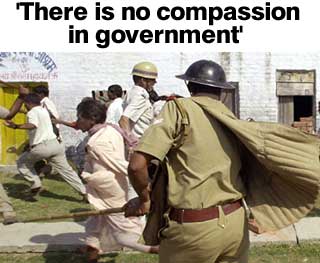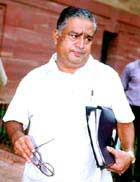Home > News > Interview
The Rediff Interview/T S R Subramaniam
February 17, 2004

Former Cabinet secretary T S R Subramaniam's memoir Journey Through Babudom and Netaland has ruffled the political class. In this interview with rediff.com Chief Correspondent Tara Shankar Sahay, Subramaniam explains why he believes government in India has lost its soul.
What inspired you to write this book?
I spent close to 40 years in government which I have seen from very close quarters -- at the village, district, state capital, national and international levels. I thought I had two broad purposes in writing this book.
And what were the reasons?
One, to please myself.
Second, I found there was no record, like the British times, of people writing about their experiences. I thought it would be useful to have something on record of contemporary events, which would bring out the character of the administration.
The intention was not to be vindictive. I thought we were far too closed as far as our government system was concerned, we were behind purdah.
Don't forget, the government belongs to the people and we should be transparent unless the matter is a State secret. A few things are. But most things, what we do, how we do, the way ministers and bureaucrats behave, public interaction, the judiciary, I think these should be well known to the public. I felt we should start the practice of opening up.
There is a feeling you have exposed official secrets.

(laughs) I have gone on the principle that transparency is very, very important and it is a question of how you define official secrets. What a minister says, how a bureaucrat sits, these are not official secrets. I have not dealt with defence or internal security. There are vast areas of government with which I was concerned, both as chief secretary of Uttar Pradesh and Cabinet secretary that I have not touched.
I would recommend you read the book -- it is much more serious, it has a purpose, it conveys a story, conveys a message. I think it would be better to form an opinion after reading it, rather than go by a news report, which is a little sensational.
At which point in your career did you feel politicians began taking the system for granted?
I have traced the evolution of the role of politicians and bureaucrats in my book. At the beginning of the 1960s, politicians were raw and unused; the relationship with the bureaucracy was of a particular dimension. The bureaucrats were of the old British school. There has been a very gradual transition. The politics and the bureaucracy of the first decade of the 21st century is totally different to the flavour, aroma, indeed, the substance of 50 years ago.
What differentiates these two junctures of Indian bureaucracy?
Let me illustrate. I asked a tehsildar in Ghazipur in Uttar Pradesh on his date of retirement in 1966 (he had joined the service in the 1930s) what difference he found between when he joined service 40 years back and today. I was then the district magistrate and it was his farewell party. He said, "Those days, tehsildars thought and behaved like collectors and were treated as collectors. Today, collectors think and behave like tehsildars and are treated as tehsildars." I think that summed up the difference.
My point is, if he was alive today, what would he say? I think the standards have come down.
There is no compassion in government. Government has become too business-like. Government has lost touch with the common people. The theme of my book is that the government is run for the benefit of politicians, bureaucrats, judiciary and the professional class. The rest be damned.
Given your close observation of politicians for four decades, do you think absolute power corrupts absolutely?
Every system, particularly in a democracy, needs to have very strong checks and balances. We have seen the past, the despotic ruler without any controls who soon loses control of himself, becomes completely untramelled. That is why our Constitution provides checks and balances among the three wings of government.
Do you think that our constitutional experiment in this context has been successful?
Unfortunately, the way politics is practised today in India, I feel there are not adequate checks. Secondly, the level of awareness of the people in democratic matters is inadequate today. In Western countries, the people act as checks on political recklessness. So the president of America or the prime minister of England carefully watches public opinion. In India there is no such parameter. That important check on the way politicians function is not available in this country and that is a tragedy.
You have the Election Commission, you have the Vigilance Commission. These are to some extent artificial. They should be in-built into the system so that inside politics, they have their own code of conduct, their own ways of governing themselves. Because the public is not enforcing these.
What is the solution?
One-line answers cannot be given. I have talked of a paradigm shift in the objectives of politicians -- what they are looking for, why they come into the picture. So unless we reverse the trend, I don't see much improvement in the near future.
How do bureaucrats deal with politically-foisted elements like M O Mathai during Nehru's time and R K Dhawan during Indira Gandhi's time?
I have referred to this in my book. The problem started in a small way with the examples that you give. Unfortunately, this has become institutionalised. So within each governmental department now, you have the institution of the officer on special duty or the personal assistant to the minister who have become rival power centres. I have also talked of the rise in the power of the Prime Minister's Office which is eclipsing the legitimate role of the Cabinet Secretariat and the government in general.
We are willy-nilly shifting from a parliamentary form of government to the presidential form of government without saying so. If we want to make that change, it should be deliberate. It should not be accidental.
Is that 'accident' being enacted in our country now?
That trend has become accentuated through the 1970s and 1980s. Now rival power centres are there everywhere which are stronger than the regular power centres. Extra-constitutional authorities have become very, very powerful. This is a sad development and it needs to be curbed.
What was your experience during the Emergency?
I was secretary to the Uttar Pradesh chief minister at that time. It was very eventful. We had the Maintenance of Internal Security Act and COFEPOSA. Later, it was replaced by TADA and then by POTA. Unfortunately in India, as everywhere else, history repeats itself.
Please elaborate.
What we saw in the context of MISA and COFEPOSA, we saw in the context of TADA and now we are seeing in the context of POTA.
What was your worst experience during your stint in UP?
There was one very aggressive collector in the state's Muzaffarnagar district. Indira Gandhi's son Sanjay was enforcing the vasectomy programme with terrific vision. Every bus travelling through Muzaffarnagar would be stopped by armed people who would forcibly download every man from 17 to 70. They would be taken to a nearby camp where vasectomies would be performed on them. It came to a pass that people stopped travelling that route. This was not an isolated incident. I watched everything closely. It couldn't have been worse.
Which was the trickiest moment in your career?
By god's grace, I have enjoyed every moment. I have been posted in Geneva and Harvard, I was in Ghazipur and Ranikhet, I was in Madras. I cannot say one posting was better or worse than the other. I am grateful for the opportunity to work with people in different fields.
There was some controversy when your name was dragged in the wheat import affair during the I K Gujral government's tenure.
It was an absurd thing. The FIR registered against me and others has been withdrawn now for want of evidence. The tendency to frame people with false charges is on the increase. It is anamolous because badmashi (mischief) is also on the increase. I think serious efforts are required to discourage such a trend. Otherwise, investigating agencies like the Enforcement Directorate and the CBI will become instruments of terror as hand-maidens to the people in power.
Image: Dominic Xavier